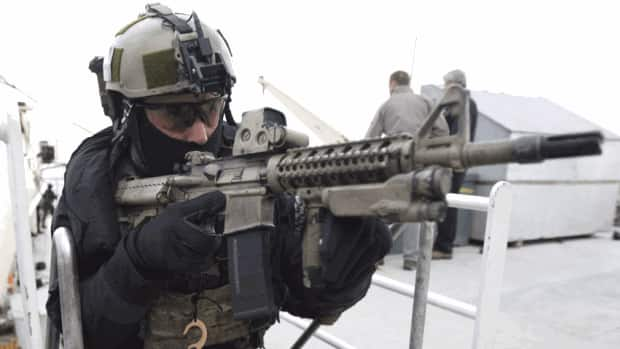[ad_1]
The cost of health claims related to hearing loss among members of Canada’s military is rising, due in part to the reluctance of members to wear protective equipment and because the most suitable devices aren’t always provided.
Explosions, gunfire, engine noise and alarms all contribute to hearing loss among military members. Almost a third of them have chronic hearing problems by the time they retire, according to surveys by Veterans Affairs.
A 2016 study obtained by Radio-Canada looked at how to better protect the hearing of members with pre-existing hearing loss, and found that military personnel were reluctant to wear hearing protection.
Some of the reasons were:
- Discomfort.
- Incompatibility with other head gear.
- The feeling of isolation that comes with sound dampening.
But the biggest reason was that earplugs or whatever other protection device used would impair situational awareness, safety and “interfere with successful completion of the mission,” wrote Dr. Sharon Abel, a senior scientist at Defence Research and Development Canada.
That has led to increased health costs for the military. The Canadian Forces Health Services Group spent about $890,000 in 2013-14 on health costs related to hearing loss, followed by $937,000 in 2014-2015. In 2015-16, the last year for which data is available, it was close to $1.1 million.

Richard Blanchette, a retired major-general, says military members need to take responsibility for their own health. (Radio-Canada)
Table of Contents
ToggleDifferent soldiers, different needs
Richard Blanchette, a retired major-general who suffered hearing loss during his years of service, said the Department of National Defence does everything in its power to protect members and it’s the responsibility of the members to do their part.
Nobody else can do it for them, he told Radio-Canada.
Different military members, however, have different issues.
Abel’s study found while earplugs may reduce the risk of hearing loss for people with normal hearing, they would increase impairment for people with pre-existing hearing loss.
Those people would be better served by more specialized protection, she wrote.
“Insufficient consideration is given to the selection of devices that will support the auditory tasks being carried out or suit the hearing status of the user.”
The military has set up an awareness program for its members about hearing loss, said Pierre Lamontagne, a defence scientist at Defence Research and Development Canada.
But soldiers remain reluctant to use some of the equipment they may need because it adds to the considerable weight they may already be carrying in the field, he said.
Health consequences
Lamontagne said he makes recommendations to commanders of the units, but it’s the commanders who make the purchases.
While about one in five soldiers needs specialized protection for hearing loss, the devices may be purchased based on general rather than individual needs, he said.
The consequences of hearing problems are not always recognized because they are invisible, according to Chantal Laroche, a professor of audiology at the University of Ottawa.
However, the side-effects — persistent ringing in the ear, for example, or an inability to communicate with others — can cause other serious health problems, including mental health issues, she said.
Laroche said that in general, specialized hearing protections can be expensive, but the military should weigh those costs against the amount they are spending on health costs and disability claims.
[ad_2]








